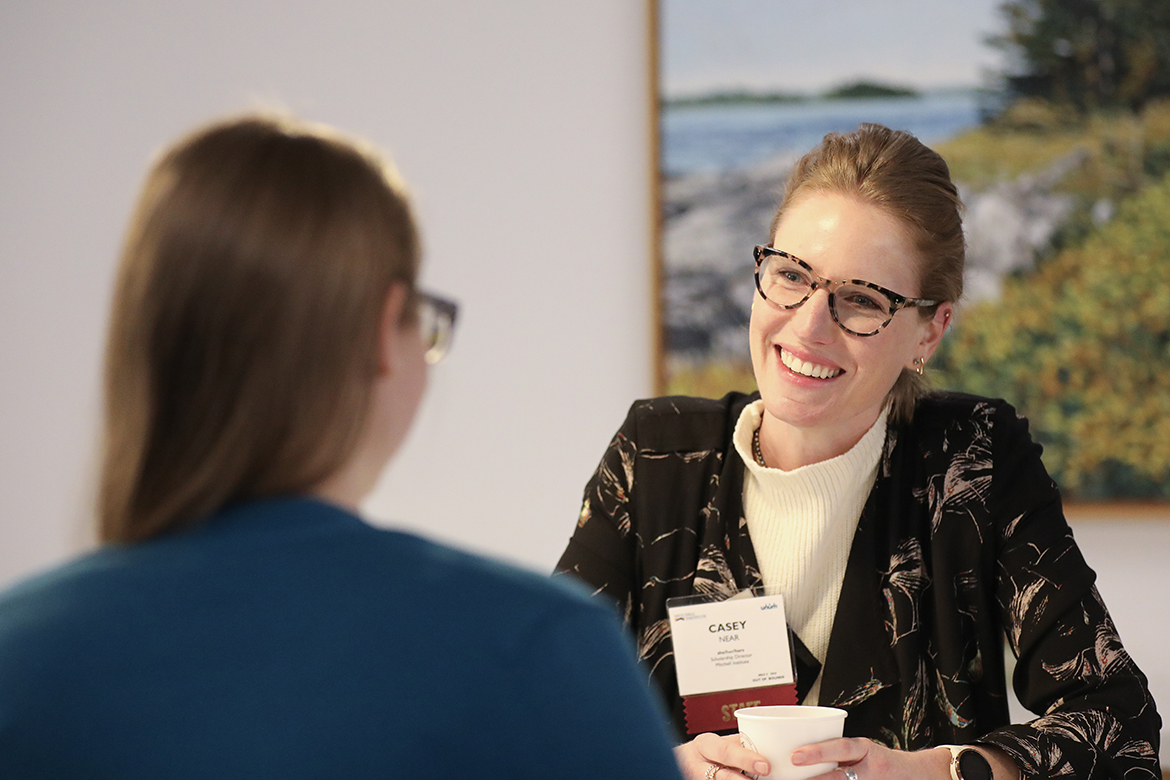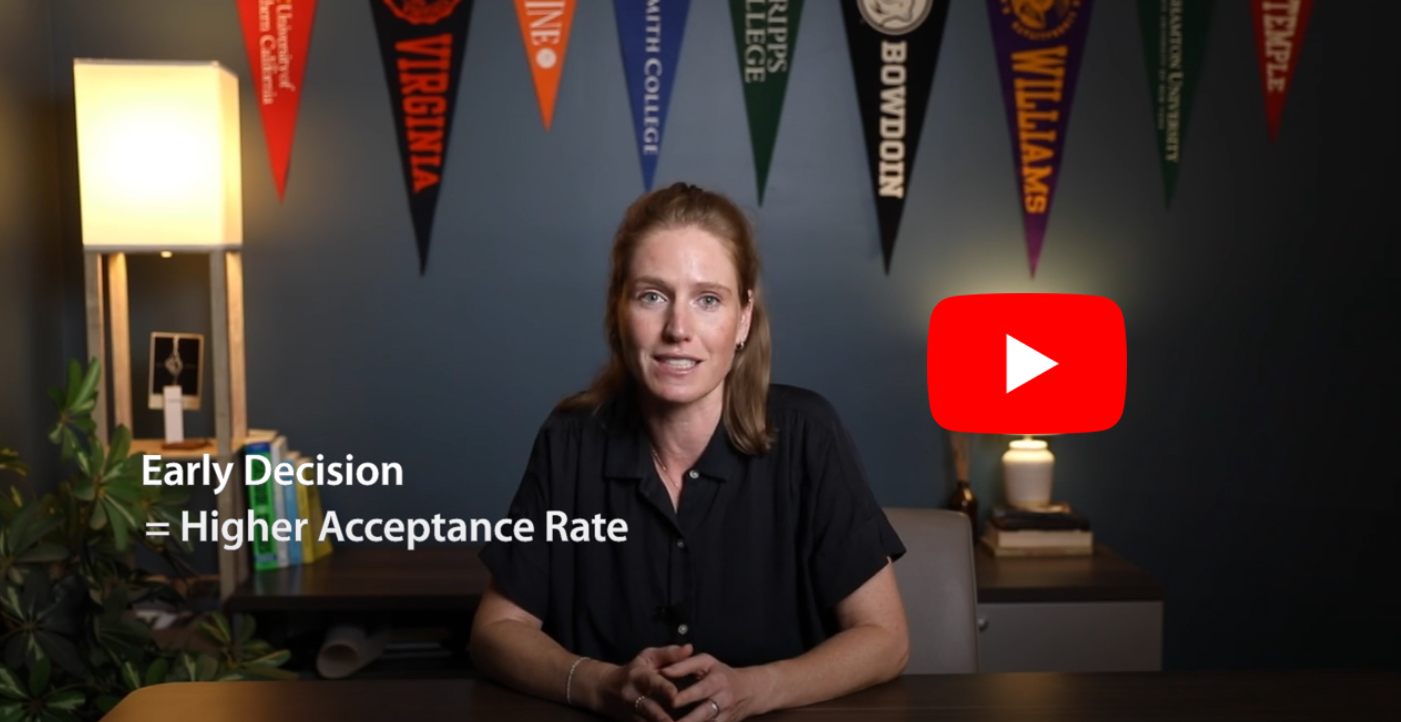Take a look at Mitchell Institute Scholarship Director Casey Near’s typical workday schedule and you’ll see she’s all in for Mitchell Scholars. When she’s not holding one-on-one meetings with Scholars to discuss a range of topics often handled by an academic advisor, career counselor, or social worker, Near is developing programming for upcoming Scholar events like the annual Welcome Celebration, campus-based receptions, and MILE I weekend.

Near, who is barely seven months into the role, is also thinking a lot about Maine students who don’t receive the Mitchell Scholarship. And the Mitchell Institute’s mission — “to increase the likelihood that young people from every community in Maine will aspire to, pursue, and achieve a college education”— looms large in her mind.
“This past year, we received 2,000 applications for the Mitchell Scholarship, and we were able to select 184,” Near said. “We pride ourselves on all we’re able to do for our Scholars, but I’ve been thinking a lot about those other 1,800 students who were aiming for higher education. Maine has thousands of students each year who consider applying for college, and I want to find ways to support them on their path to college, even if they don’t become a Mitchell Scholar.”
To make good on the Mitchell Institute’s mission for all Maine students, Near has developed new offerings to high schools statewide that aim to help guidance counselors and students alike. For her programming — both virtual and in-person — she draws on her experience as the former executive director of counseling at Collegewise, a national provider of college admission counseling, tutoring, and test-preparation services, as well as her past role as an admission counselor at Mills College in Oakland, California.
To signal to high schools that the Mitchell Institute offers Maine students far more than a scholarship, Near developed a highly informative and fast-moving video series on the college search and application process aimed at 16-to-18-year-olds. “Finding the Right College with Casey” features actionable pro tips that demystify the search process and de-stress students. (Click the image below to see all five videos.)

The multimedia series in service to counselors and high school students is a first for the Mitchell Institute, and Near says video is the right modality for her initial outreach.
“Students receive a firehose of information about college, and counselors are often dealing with urgent, ongoing issues on the frontlines with their students. Both parties can be overwhelmed in this process, and I find that videos — especially when they’re brief — can cut through the noise,” she said. “I could talk for hours about all these topics, but if I’m trying to just make it clear that college is attainable, and that applying to college could be perhaps fun, a quick video is the way to tell that story.”
Via email to every high school guidance counselor statewide, Near offered the video series, as well as a quick primer on how they can be used and shared with students. Along with the videos, she also made this offer: to visit their school with a Mitchell Scholar and provide free workshops to help all students open Mitchell Scholarship applications, as well as offer guidance on the college search and admission process.
Within days of sending the email, Near had no shortage of takers.
“We already have 22 high schools signed up for workshops, and everyone opted into a workshop on more than just the Mitchell Scholarship,” Near said. “I found that telling — that there’s excitement for the Mitchell Scholarship, sure, but there’s an appetite for more. I was also pleased to see the geographic spread. From Aroostook to York, from Oxford to Washington, there’s interest in this across the state.”
The workshops also offer Near the opportunity to deploy her newly conceived and trained cadre of Access Ambassadors — currently enrolled Mitchell Scholars who give back to their communities by returning to their high schools and helping students navigate the college search and scholarship application processes.
Among the key messages she shares with all high school students is that when it comes to college admissions, there’s no scarcity of opportunities.
“Whenever I talk about college, I first want to dispel the myth that the path to college has to be hard, at least in terms of getting in,” Near said. “It’s never been easier to get into college. We don’t share that story enough.”
The hard part about going to college, says Near, is paying for it.
“I’m happy to address those financial fears, as they tend to be rooted in some misconceptions, like public college is always more affordable, or the least expensive option is always community college,” she said. “For some students, that’s the case. But for many, a private college may provide need- or merit-based aid that covers the entire cost of college. Those tend to be academic reach schools with big endowments, but I want to make sure students are aware of the range of options available to them, apply to a healthy mix, and then weigh the options once they see the financial aid packages that are presented.”
For Near, the opportunity to help Maine students find their paths and give Access Ambassadors a chance to do good in their communities is as rewarding as helping Mitchell Scholars on their journeys through college and beyond.
“We’re much more than a scholarship to our Scholars, and I’m so proud to be part of that 30-year tradition here at the Mitchell Institute. As we enter our next 30 years, I wonder how we can be more than a scholarship to Maine’s high school students and applicants, specifically those who may never become Mitchell Scholars but who are still aiming for or considering college,” she said. “We may not be able to award the scholarship to all of them, but if they’re curious about college, I want to help them. If we can make the path to college more clear, more enjoyable, or more affordable, we can make an even more lasting impact on a generation of Mainers.”
